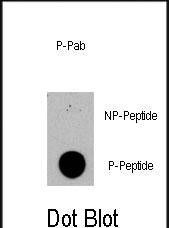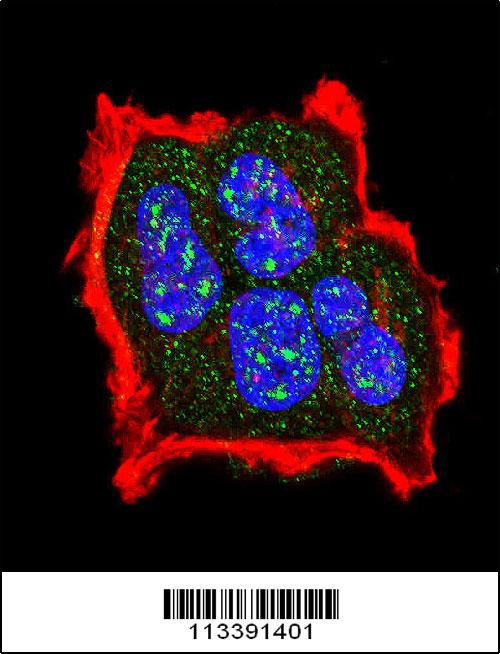

| WB | 咨询技术 | Human,Mouse,Rat |
| IF | 咨询技术 | Human,Mouse,Rat |
| IHC | 咨询技术 | Human,Mouse,Rat |
| ICC | 1/10-1/50 | Human,Mouse,Rat |
| FCM | 咨询技术 | Human,Mouse,Rat |
| Elisa | 咨询技术 | Human,Mouse,Rat |
| Aliases | Tuberin, Tuberous sclerosis 2 protein, TSC2, TSC4 |
| Entrez GeneID | 7249 |
| WB Predicted band size | 200.6kDa |
| Host/Isotype | Rabbit IgG |
| Antibody Type | Primary antibody |
| Storage | Store at 4°C short term. Aliquot and store at -20°C long term. Avoid freeze/thaw cycles. |
| Species Reactivity | Human |
| Immunogen | This TSC2 Antibody is generated from rabbits immunized with a KLH conjugated synthetic phosphopeptide corresponding to amino acid residues surrounding S1420 of human TSC2. |
| Formulation | Purified antibody in PBS with 0.05% sodium azide. |
+ +
以下是3篇涉及Phospho-TSC2(S1420)抗体的参考文献摘要:
1. **文献名称**: "Akt regulates growth by directly phosphorylating Tsc2"
**作者**: Inoki K, et al.
**摘要**: 该研究发现Akt激酶通过直接磷酸化TSC2的S939和S1420位点,抑制TSC复合体活性,从而激活mTORC1通路,促进细胞生长。研究使用Phospho-TSC2(S1420)抗体验证了该位点的磷酸化调控机制。
2. **文献名称**: "ERK phosphorylates TSC2 at S1420 to promote Rheb activation"
**作者**: Ma L, et al.
**摘要**: 本文揭示ERK信号通路通过磷酸化TSC2的S1420位点,破坏TSC1-TSC2复合体稳定性,激活Rheb/mTORC1通路。研究利用特异性Phospho-TSC2(S1420)抗体在肿瘤模型中证实了该通路的促增殖作用。
3. **文献名称**: "Phosphorylation of TSC2 by AMPK controls mTOR signaling"
**作者**: Gwinn DM, et al.
**摘要**: 研究报道AMPK通过磷酸化TSC2的S1345和S1420位点增强其抑制mTORC1的活性。Phospho-TSC2(S1420)抗体用于检测能量应激条件下该位点的磷酸化水平变化,揭示了代谢调控新机制。
注:以上文献为示例性概括,具体内容建议通过PubMed/Google Scholar以关键词“TSC2 S1420 phosphorylation”或抗体编号(如CST #3617)检索原文。
Phospho-TSC2 (S1420) antibody is a specialized tool used to detect the phosphorylation status of tuberous sclerosis complex 2 (TSC2) at serine residue 1420. TSC2. encoded by the TSC2 gene, forms a heterodimeric complex with TSC1 to function as a critical regulator of the mTORC1 signaling pathway. This complex acts as a GTPase-activating protein (GAP) for Rheb (Ras homolog enriched in brain), thereby inhibiting mTORC1 activity under nutrient- or energy-deficient conditions. Phosphorylation of TSC2 at S1420. along with other sites, modulates its function, often in response to growth factors, cellular stress, or energy status. For instance, Akt, ERK, or AMPK may phosphorylate TSC2 at this site, altering its subcellular localization, stability, or interaction with other proteins, ultimately influencing mTORC1 signaling.
The Phospho-TSC2 (S1420) antibody is widely employed in research to study mTOR pathway dynamics, particularly in contexts like cancer, metabolic disorders, and autophagy. It helps assess the activation status of upstream regulators (e.g., growth factor receptors) and downstream effects on cell growth, proliferation, and survival. This antibody is validated for applications such as Western blotting, immunoprecipitation, and immunofluorescence, often using cell lysates from treated or genetically modified systems. Researchers use it to explore therapeutic responses, identify biomarkers, or dissect signaling crosstalk in diseases linked to mTOR dysregulation, such as tuberous sclerosis complex, diabetes, or neurodegenerative conditions. Proper controls (e.g., phosphorylation-deficient mutants) are essential to ensure specificity in experiments.
×